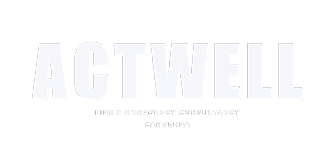
ResponseReady
The Complete Solution
About ResponseReady
At ACTWELL, we understand the critical importance of being prepared for any emergency. That's why we've developed the Response Ready program – a holistic solution designed to equip your organisation with the knowledge, skills, and tools necessary to handle emergencies confidently and effectively. Our program combines expert-led training, state-of-the-art resources, and continuous learning opportunities to ensure your team is always prepared. From detailed Evacuation Diagrams and customised Emergency Plans to hands-on fire safety training and ongoing skills maintenance, Response Ready is your all-in-one platform for achieving and maintaining compliance with Australian Standards and WHS legislation. Join us in our mission to create safer workplaces and communities where everyone is ready to respond when it matters most.
In Australia, every facility is mandated to have a comprehensive Emergency Plan in place. This obligation falls on the person conducting a business or undertaking (PCBU), who must develop, document, and regularly review a plan that addresses potential incidents, accidents, and emergencies. Workers must be adequately informed and trained in these procedures.
The Emergency Plan should be grounded in a thorough assessment of workplace-specific hazards and the potential consequences of emergencies arising from those hazards. Additionally, facilities are required to maintain up-to-date emergency evacuation diagrams, which must be prominently displayed.
Key Requirements as per AS 3745-2010 Planning for Emergencies in a Facility
Emergency Planning Committee (EPC)
Comprises building owners, agents, occupiers, tenants, and other responsible parties.
Must hold at least annual meetings.
Benefits from the expertise of external consultants like ACTWELL for specialised advice.
Members should receive foundational training to understand their roles and responsibilities.
Emergency Control Organisation (ECO)
Must be relevant and adequate for the facility.
Typically includes a Chief Warden, Deputy Chief Warden, Area Wardens, General Wardens, and First Aiders.
Members must have appropriate identification, such as hats, caps, or vests.
Emergency Plan
Must be developed and maintained for each facility.
Should include response procedures for various potential emergencies.
Must address training for building occupants and regular emergency and evacuation exercises.
Requires annual review and is valid for up to 5 years.
Evacuation Diagrams
Must be installed and meet AS 3745-2010 standards.
Training
All ECO members must undergo training and bi-annual skills retention activities.
Additional staff expected to respond to fire emergencies must receive first-attack firefighting training at least every two years.
All building occupants must be trained upon appointment and annually thereafter.
Emergency Response Exercises
Must be conducted regularly, including at least one full evacuation per year.
ACTWELL has crafted this proposal to comply fully with WHS legislation and align with AS 3745-2010 Planning for Emergencies in a Facility.
ACTWELL ResponseReady Components
Evacuation Diagrams and Emergency Plans
After gathering the client's building plans and site information, we'll conduct an on-site visit to collect additional data and map emergency equipment locations. This information will be used to finalise the Emergency Plan and Evacuation Diagrams.
Ongoing Online Training
The Response Ready Hub will serve as the platform for ongoing 'skills maintenance training for both the ECO and general staff.
ResponseReady Hub
Our innovative Hub offers a range of specialised training modules:
ResponseReady: First-Attack
For comprehensive fire safety training, including the use of fire extinguishers, fire hose reels, and fire blankets.
ResponseReady: WardenWise
For in-depth Emergency Control Organisation (ECO) training, covering evacuations, lockdowns, and sheltering in place.
ResponseReady: Occupant Aware
For educating all building occupants on general emergency response procedures.
Face-to-Face Training
This hands-on component will be delivered prior to launching the Response Ready Hub and will focus on practical training for the ECO/Wardens.
These sessions are designed to equip your team with the practical skills and knowledge needed to respond effectively in emergencies.
Training can be tailored to their specific organisation and facility depending on client needs.
Our SCORM-based training modules employ a 'choose your own adventure' style, ensuring a more engaging and effective learning experience.
Site Familiarisation
A walk-through to acquaint participants with the location and operation of emergency equipment.
System Familiarisation
Where applicable, detailed training on the Fire Indicator Panel, Emergency Warning System, and Block Plan.
Active Fire Alarm Investigation
Procedures for investigating active fire alarms, if applicable to your facility.
Warden Roles and Responsibilities
Comprehensive training on the duties and expectations of each Warden.
Evacuation Coordination
Best practices for coordinating a smooth and efficient evacuation.
Communication
Effective communication strategies within the Emergency Control Organisation
Fire Behaviour and Safety
Understanding the dynamics of fire and general smoke/fire safety measures.
Live Fire Training
Hands-on experience with fire extinguishers, blankets and hose reels, including ‘live fire’ training utilising our state-of-the-art ‘gas props’.
Training Includes
Evacuation Exercise
Post-face-to-face training sessions will be conducted to assess the effectiveness of the facility's evacuation procedures, complete with a detailed report outlining successes and areas for improvement.
Client-Specific Configuration
The Hub will be customised to align with the client's branding and specific needs, making it feel like an extension of their own platform.
EPC Meetings
ACTWELL will provide expert consultants to attend Emergency Planning Committee meetings, offering basic training and compliance advice.
Document Storage
The Hub will also store essential documents such as the Emergency Plan, evacuation checklists, bomb threat checklists, and Personal Emergency Evacuation Plan (PEEP) templates.
Record-Keeping
Detailed records of all completed training will be maintained for easy compliance demonstration.

